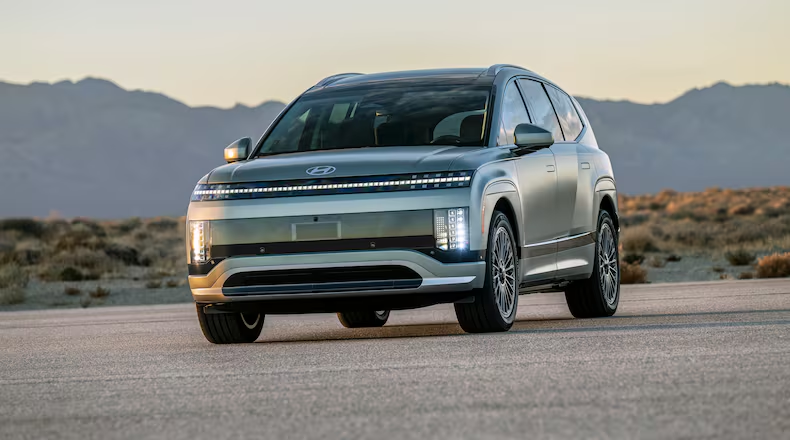The automotive world is shifting rapidly, and in 2025, hybrid and electric vehicles (EVs) are more advanced, efficient, and affordable than ever. With financial incentives associated with new EVs, including federal tax credits and state incentives, the decreasing average price of new EVs compared to gas-powered vehicles makes them an attractive option. Whether you’re drawn to lower emissions, fuel savings, or cutting-edge tech, there’s never been a better time to explore eco-friendly cars.
At Kunes Chevrolet GMC of Elkhorn, we’re here to help you understand the key benefits, compare models, and decide whether a hybrid or electric car is right for your lifestyle.
What are Hybrid and Electric Vehicles?
Definition and Types of Hybrid and Electric Vehicles
Hybrid and electric vehicles represent a significant shift from traditional gasoline-powered cars, offering a range of benefits from improved fuel efficiency to reduced emissions. Hybrid vehicles combine a conventional internal combustion engine with an electric motor, creating a synergy that optimizes fuel economy. On the other hand, electric vehicles (EVs) are powered solely by electricity stored in a battery, eliminating the need for gasoline altogether.
There are several types of hybrid and electric vehicles, each with unique features:
- Hybrid Electric Vehicles (HEVs): These vehicles use both a gasoline engine and an electric motor to enhance fuel efficiency. The electric motor assists the engine during acceleration and captures energy during braking.
- Plug-in Hybrid Electric Vehicles (PHEVs): PHEVs have a larger battery that can be charged from an external power source, allowing for extended electric-only driving before the gasoline engine kicks in.
- Battery Electric Vehicles (BEVs): BEVs are fully electric, relying entirely on a battery to power the electric motor. They produce zero tailpipe emissions and can be charged at home or at public charging stations.
- Fuel Cell Electric Vehicles (FCEVs): FCEVs use hydrogen to generate electricity through a fuel cell, providing an alternative to battery power. They offer quick refueling times and emit only water vapor.
These diverse vehicle types cater to different driving needs and preferences, making it easier for consumers to find a model that suits their lifestyle.
How They Work and Their Benefits
Hybrid and electric vehicles utilize advanced technologies to maximize efficiency and minimize environmental impact. Hybrid vehicles employ regenerative braking, which captures kinetic energy during braking and converts it into electrical energy stored in the battery. This energy is then used to assist the gasoline engine, improving overall fuel efficiency.
Electric vehicles, on the other hand, are powered by electric motors that draw energy from a battery. These batteries can be recharged from an external power source, such as a home charging station or public charging infrastructure. The simplicity of electric motors, with fewer moving parts than internal combustion engines, translates to lower maintenance costs and a smoother, quieter ride.
The benefits of hybrid and electric vehicles are numerous:
- Improved Fuel Efficiency: Both hybrid and electric vehicles offer superior fuel economy compared to traditional gasoline-powered cars, reducing the frequency and cost of refueling.
- Reduced Emissions: By producing fewer emissions, these vehicles help improve air quality and reduce greenhouse gas emissions, contributing to a healthier environment.
- Lower Operating Costs: Drivers can save on fuel and maintenance costs, as electric motors require less upkeep than internal combustion engines.
- Smooth and Quiet Ride: Electric vehicles provide a serene driving experience, thanks to the quiet operation of electric motors.
These advantages make hybrid and electric vehicles an attractive option for eco-conscious drivers looking to reduce their carbon footprint and save on running costs.
Benefits of Hybrid Vehicles in 2025
Hybrid vehicles combine a gasoline engine with an electric motor to optimize fuel economy and reduce emissions. Today’s hybrids offer:
- Excellent fuel savings—especially for city driving
- Smooth, quiet performance with fast acceleration
- Extended driving range vs. all-electric models
- Lower emissions than traditional gas-powered vehicles
- Reliable performance and long battery life with minimal maintenance
Additionally, it's important to consider how insurance premiums contribute to the overall cost of owning a hybrid vehicle.
Use our hybrid car savings calculator to estimate how much you can save annually on fuel costs.

Electric Vehicle Advantages in 2025
The latest electric vehicles in 2025 offer serious perks that make switching easier than ever:
- Zero tailpipe emissions, contributing to cleaner air and climate-friendly driving
- Fewer moving parts, meaning lower maintenance costs compared to gas vehicles
- EV tax credits in 2025, including a federal tax credit ranging from $3,700 to $7,500, along with state and local incentives, can reduce your purchase price
- Advanced EV battery life and range, with many models offering over 300 miles on a single charge
- Access to a rapidly growing network of EV charging stations in 2025, including fast chargers for quick top-ups. Electricity demand can affect charging costs, especially during peak and off-peak hours.
EVs also integrate the latest in electric vehicle technology, including over-the-air updates, smart navigation, and regenerative braking systems. Kilowatt hours are crucial for measuring EV efficiency, determining how much electricity an EV consumes per 100 miles.
Environmental Benefits of Electric Vehicles
Role in Reducing Greenhouse Gas Emissions
Electric vehicles are pivotal in the fight against climate change, offering a cleaner alternative to traditional gasoline-powered cars. The Environmental Protection Agency (EPA) highlights that the transportation sector is a major contributor to greenhouse gas emissions in the United States. By transitioning to electric vehicles, we can significantly reduce these emissions and mitigate their impact on the environment.
Electric vehicles contribute to emission reductions in several ways:
- Zero Tailpipe Emissions: Unlike gasoline-powered vehicles, electric vehicles produce no tailpipe emissions, which helps improve air quality and reduce the overall carbon footprint.
- Reduced Well-to-Wheel Emissions: When powered by renewable energy sources, electric vehicles can further decrease well-to-wheel emissions, which encompass the entire lifecycle of fuel production and consumption.
- Improved Energy Efficiency: Electric vehicles are highly efficient, converting about 60-70% of the electrical energy from the grid to power the wheels. In contrast, gasoline-powered vehicles only convert about 20% of the energy in gasoline to movement.
By adopting electric vehicles, we can drive towards a more sustainable future, reducing our reliance on fossil fuels and promoting the use of clean energy. This shift not only benefits the environment but also supports public health by improving air quality and reducing pollution-related health issues.
In conclusion, the environmental benefits of electric vehicles make them a crucial component of our efforts to combat climate change and create a cleaner, healthier world for future generations.
Hybrid vs. Electric Cars: What’s the Difference?
Both vehicle types are great steps toward sustainable driving in 2025, but they serve different needs:
| Feature | Hybrid Vehicles | Electric Vehicles |
| Fuel Source | Gas + Electric | Fully Electric |
| Driving Range | Longer (gas backup) | Limited to battery capacity |
| Emissions | Low | Zero |
| Charging | Not required | Requires access to charger |
| Best For | Long trips, flexibility | Daily commuting, short-to-medium range travel |
Need help deciding? Our team at Kunes Chevrolet GMC of Elkhorn can guide you through the pros and cons of each. Additionally, a detailed comparison of three-year ownership costs, including maintenance, fuel savings, and depreciation, can help you determine which vehicle type may be more cost-effective over time.

Cost of Owning an Electric Car in 2025
While EVs may have a higher sticker price, they offer:
- Lower fuel costs (especially if charging at home)
- Less frequent service—no oil changes, fewer brake replacements
- Eligibility for 2025 EV tax credits and rebates
- Fewer emissions-related repair concerns over time
In the long run, owning an EV can be more cost-effective due to these lower operating costs.
Many states provide additional incentives for purchasing electric vehicles, further reducing the overall cost of EV ownership.
Many owners discover that the total cost of owning an electric car over five years can be cheaper than that of a gas-powered vehicle.
Green Transportation Options at Kunes Chevrolet GMC of Elkhorn
At Kunes Chevrolet GMC of Elkhorn, we carry a growing selection of:
- Best electric cars of 2025 from trusted manufacturers
- A variety of electric vehicle brands
- High-efficiency hybrid models with proven performance
- Plug-in hybrids for the best of both electric and gas driving
- Budget-friendly and luxury EV options to match every lifestyle
We’re committed to making energy-efficient cars accessible, understandable, and affordable for all drivers.
Why Buy a Hybrid or EV from Kunes Chevrolet GMC of Elkhorn?
- Expert advice on choosing the right model
- Guidance on home charging, range, and EV lifestyle
- Access to current EV incentives and tax credits
- Competitive financing and trade-in support
- Full service and support for your vehicle’s lifetime
Ready to Drive Into a Cleaner, Smarter Future?
Let our team help you discover the right low-emission vehicle for 2025. Visit Kunes Chevrolet GMC of Elkhorn to test drive the latest hybrid and electric models and learn how to reduce your carbon footprint—without sacrificing performance.

